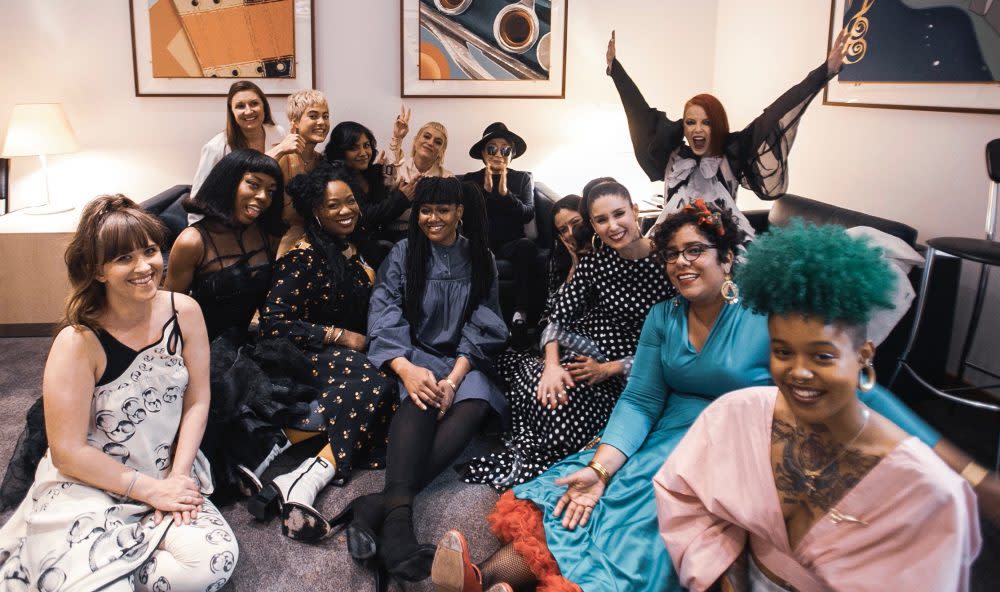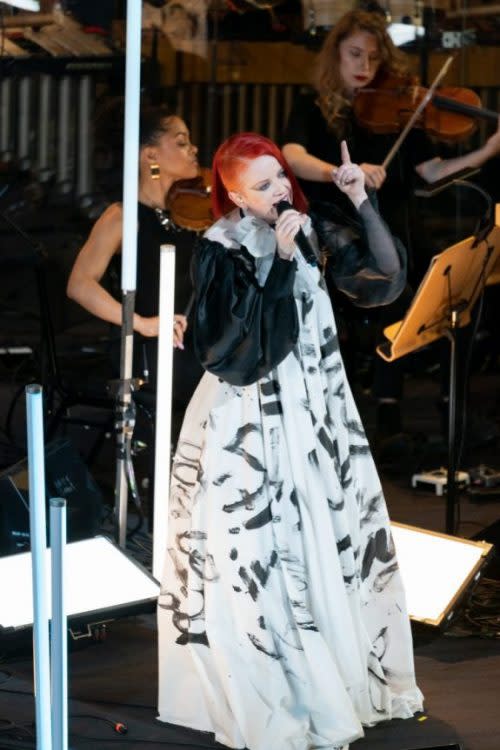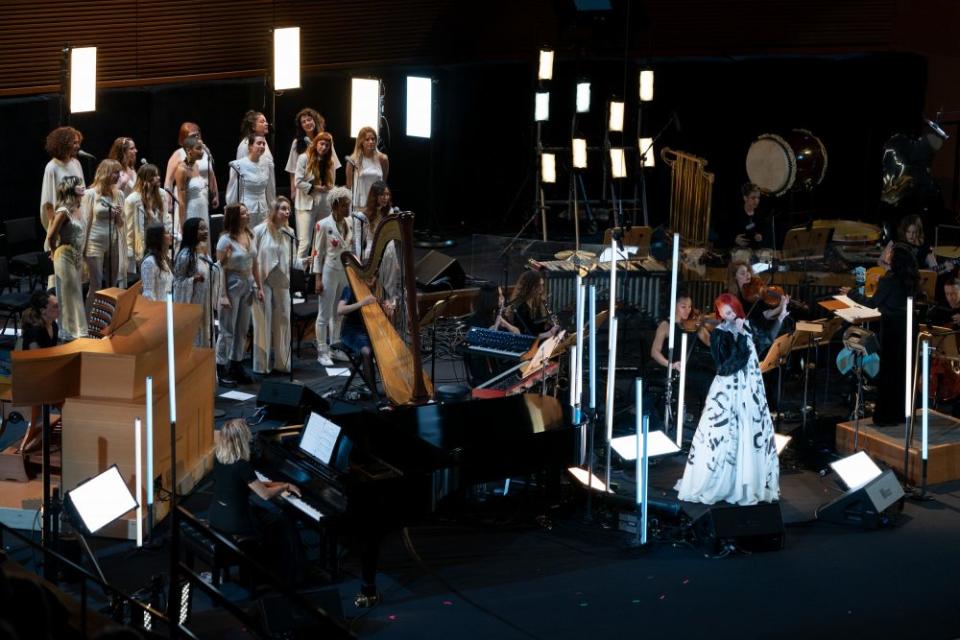Concert Review: Yoko Ono Earns a Wide-Ranging, All-Female Salute at Disney Hall

Yoko One was — is — nothing if not an artist of many facets, as someone who started out in the most avant-garde corners of the visual and performance art worlds and ended up having a flair for conventional pop songwriting. Both sides, the disrupter and the sentimentalist, were celebrated in a wide-ranging tribute concert Friday at L.A.’s Walt Disney Hall, where a cast of dozens of women participated in “Breathwatchlistentouch: The Work and Music of Yoko Ono,” as the 86-year-old artist looked on from a few rows back.
It was all-female, but not “all-star,” as Girlschool LA, which produced the show in collaboration with the L.A. Phil and the Fluxus Festival, drew on a satisfyingly eclectic mix of mostly local talent for the lineup. It did wrap up with a couple of big rock ‘n’ roll names. One was Garbage’s Shirley Manson, who chose a pair of songs that encapsulated Ono’s most angst-ridden and domestically tranquil sides. The other was St. Vincent, who eschewed music altogether in favor of a sexually explicit comedy bit — a puzzling performance that could only be understood as an attempt to re-embrace Ono as less of a cuddly figure and more of an OG provocateur.
Related stories
Weinstein Co. Sued Over Trademark Infringement in Bill Murray Film
Greta Van Fleet's Sam Kiszka on Rock, Grammys Recognition and Partying With Elton John
Highlights abounded, in any case, among the performers who may have been less familiar to much of the sold-out crowd: a bilingual turn by La Santa Cecilia’s La Marisoul; a pair of transfixing dance pieces performed or choreographed by Nina McNeely; and singers like We Are KING, Amber Coffman and Sudan Archives exploring a pop-R&B side of Ono that was either latent or being freshly forged just for this occasion.
It was left to Manson to offer the night’s lengthiest testimonial — and also a passing acknowledgement that Ono was one of the most polarizing entertainers, if that’s not too reductive a word, of the 20th century. “I’m going to try not to cry, because I have loved this woman since I was a baby girl in school in Edinburgh, Scotland,” said the Garbage singer. Manson then corrected, that timeline as she noted her appreciation had been an evolution. “This extraordinary person, who I love… When I was 12 years old, I loathed Yoko,” Manson admitted. “And I didn’t understand as a young woman what it was she represented, what she was trying to say to the world… and it’s only as an adult that I started to understand and appreciate just exactly what not only have you done for me… but for the generations who are going to follow behind all these beautiful young women who are here tonight. Yoko Ono, you are not even close to getting the recognition that you deserve,” Manson said, as the applause began to drown her out.

In calling out next-generation women, Manson was referring at least in part to the sizable ensemble behind her: an 18-member chorus dressed in white, three string players, two brass and woodwinds, and a seven-piece band, on top of the behind-the-scenes Girlschool LA org founded by Anna Bulbrook (of the Airborne Toxic Event). For the last several years, Girlschool LA has put on annual festivals in L.A. clubs, though for this show they invaded a very different hall than the Bootleg, saluting Ono in conjunction with the Fluxus Festival, an ongoing series at Disney Hall that’s celebrating the interdisciplinary art scene of the 1960s and early ‘70s of which she was at least tangentially a part.
The extra-musical side of Ono’s art got a nod first from some interactive art installations outside Disney Hall’s auditorium (but, alas, no giant ladder that led to a “YES” on the lobby ceiling). In performance, as well, there were inclusions that took the show outside the traditional realm of tribute concert. Kamil Oshundara read “Question Piece,” a series of contemporary social/poetic queries in the style of some of Ono’s published work, accompanied by a violinist who was the only man on stage all night. Nina McNeely’s eight-piece troupe, accompanied by the hall’s pipe organ, performed a fascinating piece of dance just unnerving enough that it wasn’t a complete surprise to read the program notes and see that she did just do the choreography for the horror/dance film now in theaters, Gaspar Noe’s “Climax.”
But the devoted-lover and pop traditionalist sides of Ono got even more recognition. Most notably, there was “Yes, I’m Your Angel” — a tune familiar to millions of “Double Fantasy” owners as the “tra-la-la-la-la” song — which sounded right out of the Harold Arlen or Tin Pan Alley songbook in the hands of We Are KING, who performed it with just piano, harp and slight additional orchestration. They ramped up the R&B a bit more when the full band kicked in for their second number, “Don’t Be Scared,” from a subsequent album of John Lennon and Ono music, “Milk and Honey.”
Sudan Archives, a more experimental R&B singer who’ll soon be seen at Coachella, had the most strikingly elegant look of the night, in a long, partly sheer black gown — and brought an elegant sound to go with it with her electric violin breaks in a brooding take on “Dogtown,” one of the searing songs Ono released on “Season of Glass” in 1981. On the lighter, literally fluffier side, former Dirty Projectors member Amber Coffman turned “Listen, the Snow is Falling” into something you could imagine Smokey Robinson singing, thanks partly to some rhythm guitar interjections straight out of Motown. Francisca Valenzuela’s “Sister, O Sister” made good use of the rock ‘n’ roll unit on stage and provided a reminder of the time when new wave acts like the B52s professed their adoration for Ono.
Things took a stranger turn when St. Vincent was called to the stage for the penultimate performance. Would one of the great rock artists of our time sing one of the better-known Ono songs no one else had gotten to Friday, like “Walking on Thin Ice”? But she quickly announced that she was going to read excerpts from Ono’s 2013 book “Acorn,” a collection of inspirational instructions for greater spirituality in daily living, “juxtaposed with a good friend of mine, queer composer Nico Muhly’s ‘Grindr Posts by Yoko’ period.” She proceeded to alternate between Ono’s sometimes touching aphorisms and what amounted to (allegedly) Muhly’s dirty jokes about aggressive male sexual customs, starting with a description of casual public sex in Central Park’s Strawberry Fields. “No fats, no femmes. Okay, some fats,” she said in conclusion, following a Yoko quote about the “silent, courageous people” in the world, and the irreverent jokiness almost seemed like it was meant to take the piss out of Ono’s earnestness, although that surely wasn’t the real intent. The audience laughed— out of appreciation or nervousness— and anyone who’d bought a ticket hoping to see St. Vincent strap on the guitar seen in the promotional photos dealt with dashed expectations accordingly. Whatever you might have thought of St. Vincent’s contribution, it did effectively honor Ono’s roots by being polarizing.
Manson re-moored the show with two complementary songs about Ono’s life with Lennon: first, the angry, yearning “What a Bastard the World Is” — which is really a song about what bastards men can be (and a convincing case it is) — presumably written during a rough spell in the early ‘70s, and then the more hopeful “Nobody Sees Me Like You Do,” one of the songs she released on “Season of Glass,” soon after his death. Although the show writ large made a good case for Ono’s breadth, so did Manson’s climactic mini-set, all by itself. And a climax it was, with bells and timpani signaling grander pop ambitions and emotions.
As much as the show wanted to pay tribute to Ono’s envelope-pushing early years, it became clear from the late ‘70s onward that she really sought to be a uniter, not a divider, emphasizing messages of peace, hope and love over outlier art-world signifiers. And so the inevitable finale was an audience sing-along of “Imagine,” the Lennon song that Ono was recently officially given co-writing credit on, with Manson saying she was responsible for “the philosophy behind it and many of the ideas and I’m sure probably many of the lyrics. We’re going to sing her song, the song of the 20th century.”
Given the composition of the cast and crew honoring Ono as an ultimately triumphant underdog, there seemed to be an additional unspoken message: Imagine the future is female.

Sign up for Variety’s Newsletter. For the latest news, follow us on Facebook, Twitter, and Instagram.

